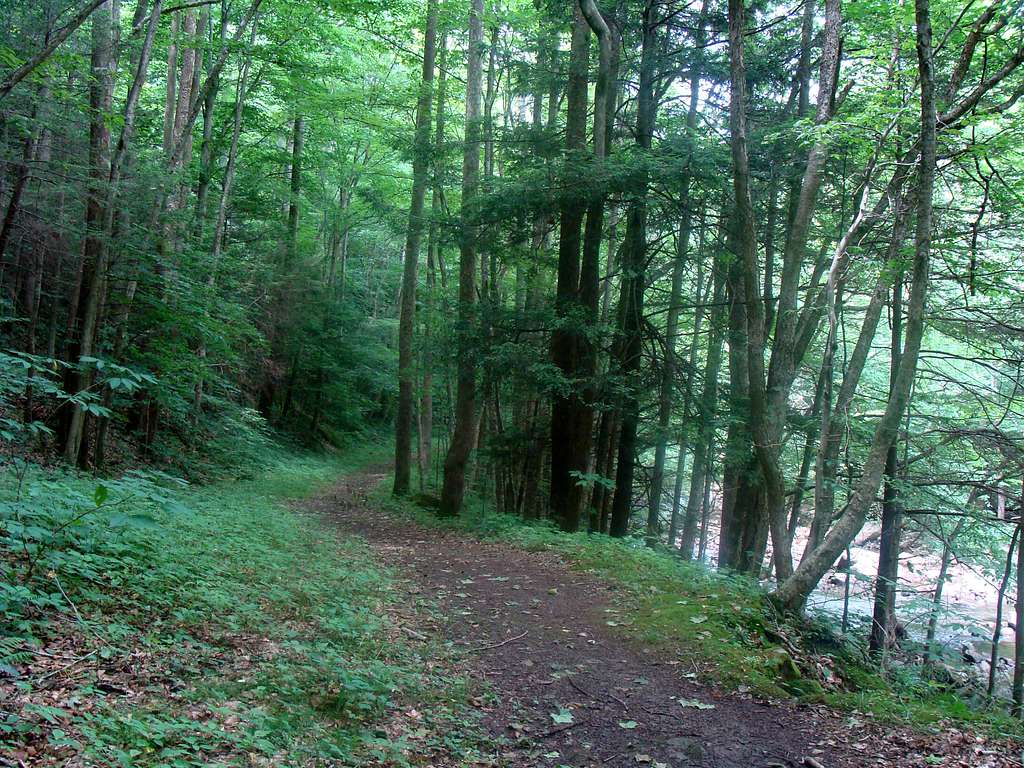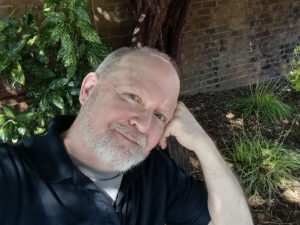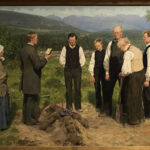Since my daughter died, I often hike for hours and miles each day. I find solace in these jaunts through the Carolina woodlands. Does it help? Yes. And no. Many mourners relate that in nature they feel their dead loved ones near, joining them as surely as fish or birds or chattering squirrels. “Most wanderers have lost something,” observes David Brown Morris, Emeritus Professor at the University of Virginia. “Solitude comes to embrace emotional experiences ranging from social isolation to cosmic interconnection.” This has certainly been true for me.
Nature may not be safe, but it is communal. I usually walk along the creek, resting for up to an hour at a time on large rocks in the stream. Birds stop by, and deer, often in small herds. Now and then an otter passes, sometimes quite close, unaware of my presence or uninterested. Beavers, though nocturnal, rear their heads to see what I’m up to.
There’s an occasional black bear, terrifying but relatively congenial, as long as we both understand which of us runs the wood. (It isn’t me.) Our local bobcat is intriguingly bold. I’ve spotted him around dawn. He approaches the water, pauses, looks my way, then drinks, stealing glances. Bobcats rarely stalk large mammals. This one seems to have little interest in me other than as a potential threat.
The deep wood is a dangerous place. I make plenty of noise before sitting down on whichever rock I find that day, splashing through the creek, coughing, or daring a Pavarotti impersonation. This chases away the snakes and small critters. Even lumbering skunks and porcupines saunter off if I alert them to my presence in advance.
More than once, alone in the wood, I’ve whispered a well-known line from Wendell Berry: “I come into the peace of wild things / who do not tax their lives with forethought / of grief.” The poet refers to inner quiet, but at times I chuckle at the complete lack of outer peace in nature. Once the birds and frogs have grown accustomed to me, there’s no shutting them up. Sudden silences alert me to keep an eye out for predators.
Hawks float overhead, circling, sometimes hunting, but often as not seeming to catch the wind out of pure joy. One memorable week, a male broad-wing joined me for breakfast each morning. It was early spring. I walked to the creek, about a mile into the wood, and settled onto a large boulder beside the stream. There I ate fruit and nuts. Within minutes, a young hawk gracefully settled on a branch no more than ten feet overhead. He often stayed there as long as I did.
Samuel Taylor Coleridge and William Wordsworth, working together on Lyrical Ballads, suggest that when wandering alone “accidents of light and shade” may transform the known and familiar into places of unforeseen discovery. Wordsworth reportedly walked some 175,000 miles in his lifetime. He spoke of “the bliss of solitude” that combines specific locations with reality and memory.
Coleridge and Wordsworth helped to launch the Romantic Age in English literature. They saw reconciliation between self, nature, and the invisible world as possible and desirable. There was no Romantic School, per se; merely brilliant, likeminded and highly creative individuals who indelibly influenced nineteenth-century culture.
They were a cantankerous lot. Most did not consider themselves part of the fraternity and sought distance from such epithets. In Germany, for example, to be called a Romantiker, or romantic writer, was an insult, not a compliment. The word Romantische was usually spoken with a sneer by those we now describe as, well, Romantics.
One early Romantic tradition held that a person could transform his perception of the world by looking inward while reaching outward. In this regard, Romantics acknowledged a profound debt to nature, without which there could be no artistic creation at all. “—these are the music and pictures of the most ancient religion,” Ralph Waldo Emerson observed.
Nature’s benefits for the bereaved have been acknowledged for centuries. Francis Bacon prescribed “contemplations of nature” for sadness. This led English poet Joseph Addison to observe that panoramas of nature “are able to disperse grief and melancholy.” One modern researcher, based in Montana, concluded that experiences of weeping and other deep emotions in response to nature provide transformation and unity of mind and body.
Put another way, in nature our grief is not easier but may at times be eased. Wandering grounds us in ways we may miss otherwise, providing unhurried accidents of clarity that assure us we are not alone.
Another inveterate walker, Friedrich Rückert, was a post-Romantic poet whose work is at once hopeful and pessimistic about life’s transience. In a deliciously wry and popular poem, Rückert writes in the voice of al-Khidr, the eternally youthful wanderer of Islamic tradition first alluded to in the Qur’an.
Khidr visits the same location every five hundred years. At first it is a city. How long has this been here, Khidr asks? “It’s always been this way,” a man tells him, “as it will forever and a day.” Five centuries later, Khidr finds a vast grassy knoll in the same spot. A shepherd is tending his flock as he plays a fife. How long has the city been gone?, Khidr asks. “Things come and go their way,” the shepherd replies. “This has been my pasture forever and a day.”
Another five hundred years, and on the same road is a sea. A fisherman gives Khidr an identical answer, as does a woodsman—yet another five centuries later—who insists that his ancestors had always lived in the forest that now thrives there. In the final stanza of Rückert’s poem, the wandering Khidr returns:
500 years went by and then I passed that way again. I came upon a city: the hue, the cry, the bustle of people rushing by. I asked, How long has this city been here? Where is the wood, the sea, the fife? They yelled back at me in their strife: "It's always been this way, as it will forever and a day." I'll wait 500 years and then I will pass this way again.
Time brings slowness to grief. Respected expert Dennis Klass notes in his book, The Spiritual Lives of Bereaved Parents, that all mourners must adjust psychologically and socially to loss, whether we would or not. But there is something more going on. We also face a new “transcendent reality,” as Klass puts it, in which we see the spiritual world with new eyes. This may include changed views of the sacred, nature, and time itself.
For example, in our new calendar of grief, many of us seem to measure days and years differently. Three months after our loved one dies, we may feel as though only a day has passed. After a year, it seems no more than a week; five years, and the pain is as fresh as last month. Time seems to shrink. Conversely, it also seems endless. Our new perception gives weight and meaning to the briefest moments, as though we might slip sideways and disappear.
Grief often has an aspect of delayed, continuous shock. Because of this, walking in nature holds great risks. We are not as alert as we should be. We may miss the dangers around us. But nature also offers unexpected rewards. “Everybody needs beauty as well as bread,” observed John Muir, “places to play in and pray in, where nature may heal and give strength to body and soul alike.” In the deep wood, surrounded by so much life, I feel my daughter near and the concern of an attentive God. I may wander in solitude, but I am not alone.
Image via Collections – GetArchive






1 comment
Rob G
Lovely meditation, David. I’ve long been a nature lover, but several years back I both lost my father and had a long-term relationship abruptly end within a couple months of each other. Since then my walking and spending time in the woods has increased, and in a certain sense it has become something like a necessity.
Very sorry for the loss of your daughter. You may be interested in the long poem “Miami Woods,” by the 19th century writer William D. Gallagher. He too was a lover of nature who lost a daughter, in his case to a fatal illness in her teen years. I wrote about the poem here:
https://www.lightondarkwater.com/2018/12/52-poems-week-51-excerpt-from-miami-woods-william-davis-gallagher.html
Not unlike Bryant or Whittier, to whom his style is similar, when Gallagher veers off of life and nature into political or historical matters the poem can get clunky. But those moments are few — the rest of the poem is not only good, but quite inspired in places.
I was fortunate enough to find an ex-lib copy of the original edition at a decent price, but there is a recent reprint by something called the ‘Leopold Classic Library,’ which I’d guess is a print-to-order house which issues facsimile editions. Can’t speak to the quality of that one, as I haven’t seen it.
Comments are closed.